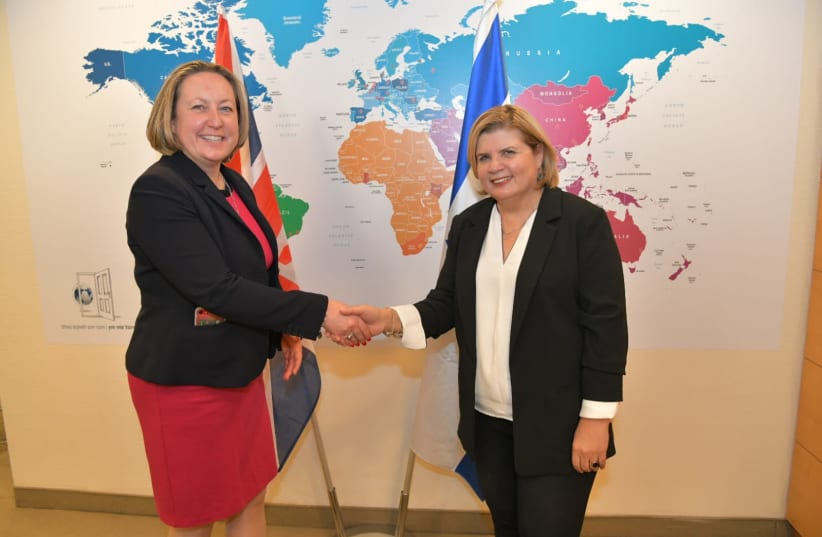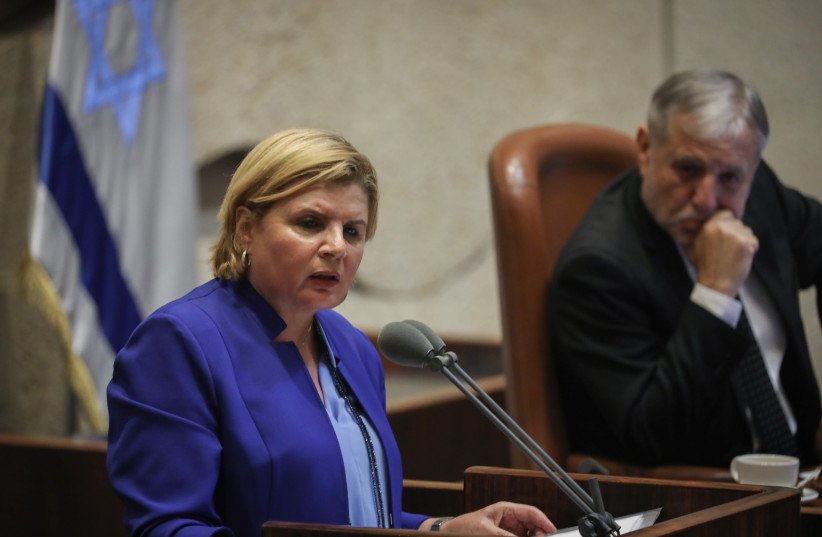The word that British International Trade Secretary Anne-Marie Trevelyan used in her answer to almost every question in an interview in Jerusalem on Wednesday was “opportunity.”
Visiting Israel for the first time to kick off talks for an expanded free trade agreement (FTA) between the UK and Israel, it was clear that Trevelyan saw great potential for the business ties between the two countries. She started her three-day visit with meetings with her Israeli counterpart Orna Barbivay and Science and Technology Minister Orit Farkash-Hacohen.
The UK is Israel’s third-largest trading partner, with an overall trade relationship close to NIS 21 billion ($7b.) annually. The countries signed an FTA in 2019, as Britain was leaving the European Union, which went into effect on January 1.
The existing agreement is based largely on Israel’s 1995 agreement with the EU, and does not specifically take into consideration Israel’s tech sector, among others.
Trevelyan says she is now “really keen to build on [the existing agreement] and have a much deeper and broader FTA that brings in services – a huge part of both economies – in the digital space and innovation. We’re thinking about those many new world-leading areas in business that both the UK and Israel are so good at, to work together and think about how we can maximize the benefit for both economies. It’s an opportunity for the UK and Israel to work together and make something really exciting.”
The FTA, she said, is also “part of the wider strategic commitment our prime ministers are pushing us all to get on with. There’s nothing like leadership, from the top, to really help encourage and open doors.”
UK Prime Minister Boris Johnson and Foreign Secretary Liz Truss are “very passionate” about deepening ties with Israel, Trevelyan said.
Earlier on Wednesday, Trevelyan tweeted a “call for input” from businesses and the public on the new FTA.
The minister said she wants to cut down market barriers for British businesses to work with their Israeli counterparts, and the call will give a clearer picture of areas that she should be discussing.
She hoped that the new agreement will be completed within a year.
One of the elements Trevelyan was most excited about discussing was a UK-Israel Innovation Summit, expected to take place this spring in London.
“It’s an opportunity for both of us to showcase our leading-edge businesses, and an opportunity to drive forward that part of the FTA,” she said.
Among the areas to be covered in the summit are life sciences, cyber, Artificial Intelligence and possibly space.
“Key businesses are doing amazing things, and it will be a great opportunity to more widely tell the story of what the FTA is about and what our plans are,” Trevelyan stated.
Trevelyan said she was also interested in seeing the Tel Aviv Light Rail project because the UK is a world leader in building infrastructure.
“We want to see how we can join those up so that Israel can get that UK expertise to help them do some of that stuff,” she said.
TREVELYAN’S VISIT came days after Israel chose groups of Israeli, French and Spanish businesses to build the light rail’s green and purple lines, rejecting groups with Chinese businesses, amid pressure from the US to do so.
Israeli officials have lamented the lack of alternatives to Chinese bidders on infrastructure tenders, especially in the area of communications.
Trevelyan said that while it is the Israeli government’s choice how to handle it, she is “absolutely keen to understand... why aren’t [UK businesses] bidding if there are great opportunities in Israel,” and her call to the public will help her do that.
“As part of the FTA, we can release market barriers to help business flow more easily,” said Trevelyan. “We have extraordinary expertise. I would like us to be more active here to figure out what the blockers are to seeing UK businesses help build that infrastructure.”
Trevelyan was the UK’s energy secretary before her current position. She continues to be interested in adaptation and resilience to climate change, and plans to hear more about related technologies on a visit to the Hebrew University.
“How can we make sure we drive forward technology as part of the solution to climate change?” she said. “There are really exciting things going on in Israel about that.”
Climate change was part of the UK’s FTA with Australia, which had environmental chapters, and Trevelyan plans to look into its relevance for the agreement with Israel, which she said is doing “fantastic work” on use of water and energy.
“I am thinking about how trade and technology can help solve that,” she said. “By working together through our universities and other scientific connections, we can help really both get an economic benefit for our countries, and there is a moral imperative to tackle some of these existential challenges. There are exciting opportunities there.”
The UK is one of the centers of the BDS movement against Israel. Trevelyan spoke with The Jerusalem Post the day after Amnesty UK released its report accusing Israel of being an apartheid state, and questioning whether the Jewish state should have ever been established.
“That isn’t language I would ever want to see used” about Israel, she said. “Amnesty is free to publish any report they like, but it is not language that I think is in any way reasonable.”
When it comes to boycotting efforts, Trevelyan said that “the UK is absolutely committed to Israel as a strategic friend and ally. The [memorandum of understanding] that our respective foreign ministers signed in November sets out very clearly the commitment to the relationship and the growing depth of relationship that the UK wants to establish with Israel.”
The Abraham Accords also have the potential for expanding trade, she said: “It’s an exciting opportunity to tell the story about friendly countries that want to use their economies to build the strength of the countries, for populations who need jobs, growth and investments… for the benefit of their countries and their neighbors.”
Ahead of Trevelyan’s visit, the Economy Ministry pointed out that Israel has an economic liaison office in London, “a global economic center and home to international headquarters of many multinational corporations and financial institutions on the technological forefront.”
The economic liaisons deal with areas like cyber defense, fintech and green energy, among others, and help Israeli companies find economic opportunities in the British market.

